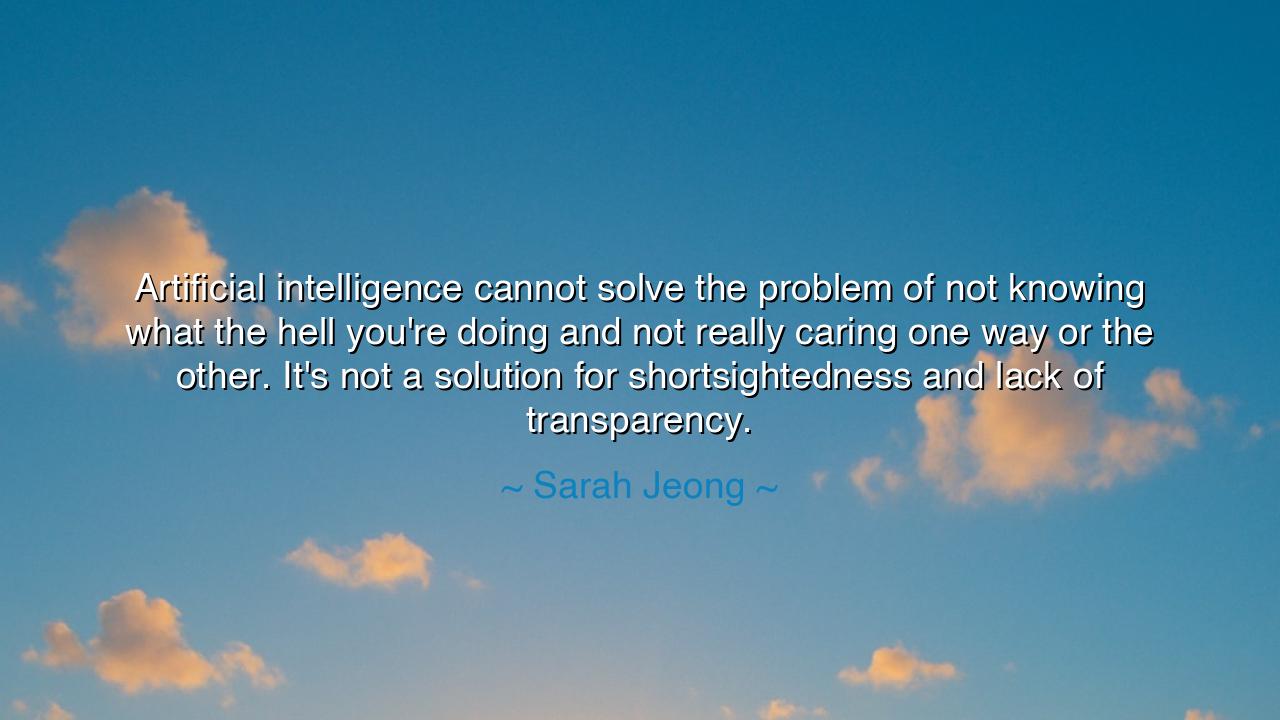
Artificial intelligence cannot solve the problem of not knowing
Artificial intelligence cannot solve the problem of not knowing what the hell you're doing and not really caring one way or the other. It's not a solution for shortsightedness and lack of transparency.






“Artificial intelligence cannot solve the problem of not knowing what the hell you're doing and not really caring one way or the other. It's not a solution for shortsightedness and lack of transparency.” Thus spoke Sarah Jeong, a voice of sharp wit and sober vision in the age of machines. Beneath her words lies not cynicism, but wisdom: a reminder that no invention, however vast or brilliant, can replace the human conscience. Her declaration cuts through the noise of modern worship for technology, revealing an ancient truth—that tools are only as wise as the hands that wield them, and no machine can redeem the blindness or apathy of its maker.
To understand her meaning, one must first see the spirit of the times in which she spoke. Humanity, dazzled by its own creation, stands at the dawn of the age of artificial intelligence—a new Promethean fire. With algorithms that learn and systems that see, we have given birth to something that mimics intelligence, though it does not yet feel or dream. In our zeal, many have begun to hope that AI will cure all ills—ignorance, error, corruption, and even the failures of leadership. Yet Jeong warns us: technology is not salvation. It magnifies our strengths, yes—but it also amplifies our weaknesses. A foolish soul armed with power does not become wise; it becomes dangerous.
The ancients foresaw this paradox. The myth of Icarus speaks of it—how man, enamored by the brilliance of his own invention, flew too near the sun and fell. Likewise, in every age of progress, humanity has mistaken power for wisdom. The printing press brought enlightenment, but also propaganda. The atom split brought energy, but also destruction. Now AI stands before us, shimmering with promise, yet fraught with peril. Jeong’s warning echoes across the centuries: a tool cannot save a civilization that has lost its moral compass.
When she speaks of “not knowing what the hell you’re doing,” she points not to ignorance of code or computation, but to the moral ignorance of those who build and deploy such systems. AI cannot cure greed in corporations, nor mend the vanity of governments that hide their motives behind algorithms. Likewise, when she speaks of “not really caring,” she condemns the apathy that allows injustice to be automated. What good is intelligence—human or artificial—if it serves no higher vision? Without transparency, without accountability, intelligence becomes merely another mask for power.
Consider the lesson of the Challenger disaster in 1986. The engineers had the technology to send humans into space, yet the tragedy occurred not from mechanical failure alone, but from organizational blindness and a failure of honesty. Warnings were ignored, data was twisted, truth was buried beneath haste and pride. The shuttle was lost, and so were lives. In this, Jeong’s words ring clear: no system—no computer, no algorithm, no machine—can fix the moral failings of those who refuse to look clearly or care deeply. The problem is not in our tools, but in our hearts.
Yet, her message is not despair. It is a call to awakening. For she reminds us that wisdom must precede invention, and responsibility must guide discovery. AI, like all human creation, is a mirror; it reflects what we are. If we fill it with care, transparency, and truth, it may yet serve the good. But if we build it upon deception, haste, and indifference, it will only magnify our ruin. The question, therefore, is not what machines can do, but what kind of people we choose to become.
So, my children of the digital age, take this counsel: do not place your faith in machines to solve the problems of the soul. Strive first to know what you are doing, and why. Cultivate the virtue of care, for indifference is the root of decay. Build not only with brilliance, but with humility. Let transparency be your law and compassion your guide. For no intelligence—artificial or divine—can rescue those who have abandoned their own humanity. The future belongs not to the most powerful, but to the most wise, honest, and awake.






AAdministratorAdministrator
Welcome, honored guests. Please leave a comment, we will respond soon